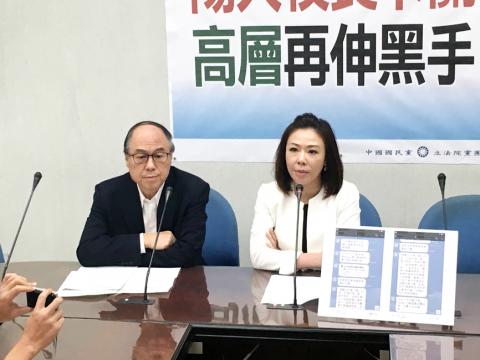The Ministry of Education yesterday dismissed allegations by Chinese Nationalist Party (KMT) lawmakers that it had been pressured into allowing former Centers for Disease Control (CDC) director-general Steve Kuo (郭旭崧) assume the post of National Yang-Ming University (NYMU) president.
Kuo was elected in October and was scheduled to assume office today.
Speaking at a news conference at the legislature, KMT caucus vice secretary-general Lee Yen-hsiu (李彥秀) said that neither Kuo’s rank nor his tenure in a teaching post make him qualified to serve as a university president.

Photo: Cheng Hung-ta, Taipei Times
Kuo is an associate professor who left his teaching post at the university after he was appointed CDC director-general in 2014, Lee said, adding that all of the university’s previous presidents were professors.
She presented screenshots, which she said were sent to her by one of her sources, allegedly showing that at 4pm on Wednesday, NYMU presidential election committee convener Chang Hung-jen (張鴻仁) had pressed 21 other committee members to sign off on Kuo’s qualification check by 7pm that day, so that the ministry could complete the paperwork in time for Kuo’s hiring.
“We have learned that someone from top management telephoned the Ministry of Education, instructing it to qualify Kuo upon receiving the committee’s decision,” Lee said.
“While we respect every university’s right to autonomy, it should not be used as a pretext to bypass due administrative process,” she said.
A source from within the ministry said officials who support Kuo’s appointment cite a 2013 legal interpretation issued by the ministry that relaxes the qualifications for university presidents, while detractors say that the ministry should be prudent about the matter and ask the university to submit additional documents to prove Kuo possesses the credentials needed for the job.
KMT Legislator Chiang Nai-hsin (蔣乃辛) said that the ministry on Monday asked the university to be prepared to elect an acting president, but it has apparently backpedaled and plans to let Kuo take office today, which is “unusual.”
The ministry should clarify whether Kuo has the qualifications to serve as president, because the public expects the university to meet certain standards, he said.
In response, Deputy Minister of Education Lin Teng-chiao (林騰蛟) said that it is within the purview of election committees at universities to vet presidential candidates and elect presidents.
Citing the legal interpretation, Lin said that the ministry in 2013 relaxed qualifications for university presidents in the hope of helping the higher education sector recruit more professionals and talent.
According to the interpretation, adjunct docents, adjunct professors, professors emeritus, visiting professors, researchers at foundations, and people with experience with research and development in the public or private sectors are qualified to serve as university presidents, he said, adding that Kuo is a candidate because he is an adjunct docent at Taipei Medical University.
Candidates that rank below professors but have a doctoral degree and have at least eight years of teaching or research experience in related fields also qualify as university presidential candidates, Lin said.
The policy on hiring academics who rank lower than a professor varies from one school to another, he said, adding that the ministry last week had asked the university to review Kuo’s credentials.
Kuo’s credentials are still being reviewed by the university, which is set to hold another meeting on the matter soon, Lin said.
Additional reporting by Rachel Lin

US President Donald Trump said "it’s up to" Chinese President Xi Jinping (習近平) what China does on Taiwan, but that he would be "very unhappy" with a change in the "status quo," the New York Times said in an interview published yesterday. Xi "considers it to be a part of China, and that’s up to him what he’s going to be doing," Trump told the newspaper on Wednesday. "But I’ve expressed to him that I would be very unhappy if he did that, and I don’t think he’ll do that," he added. "I hope he doesn’t do that." Trump made the comments in

NOT AN OPENING: Trump’s violation of international law does not affect China’s consideration in attacking Taiwan; Beijing lacks capability, not precedent, an official said Taiwanese officials see the US’ capture of the president of Venezuela as a powerful deterrent to Beijing’s aggression and a timely reminder of the US’ ability to defeat militaries equipped with Chinese-made weapons. The strikes that toppled Venezuelan President Nicolas Maduro signaled to authoritarian leaders, including Chinese President Xi Jinping (習近平), US President Donald Trump’s willingness to use military might for international affairs core to US interests, one senior official in Taipei’s security circle said. That reassured Taiwan, the person said. Taipei has also dismissed the idea that Trump’s apparent violation of international law could embolden Beijing, said the official, who was not

A cold surge advisory was today issued for 18 cities and counties across Taiwan, with temperatures of below 10°C forecast during the day and into tonight, the Central Weather Administration (CWA) said. New Taipei City, Taipei, Taoyuan and Hsinchu, Miaoli and Yilan counties are expected to experience sustained temperatures of 10°C or lower, the CWA said. Temperatures are likely to temporarily drop below 10°C in most other areas, except Taitung, Pingtung, Penghu and Lienchiang (Matsu) counties, CWA data showed. The cold weather is being caused by a strong continental cold air mass, combined with radiative cooling, a process in which heat escapes from

Tourism in Kenting fell to a historic low for the second consecutive year last year, impacting hotels and other local businesses that rely on a steady stream of domestic tourists, the latest data showed. A total of 2.139 million tourists visited Kenting last year, down slightly from 2.14 million in 2024, the data showed. The number of tourists who visited the national park on the Hengchun Peninsula peaked in 2015 at 8.37 million people. That number has been below 2.2 million for two years, although there was a spike in October last year due to multiple long weekends. The occupancy rate for hotels